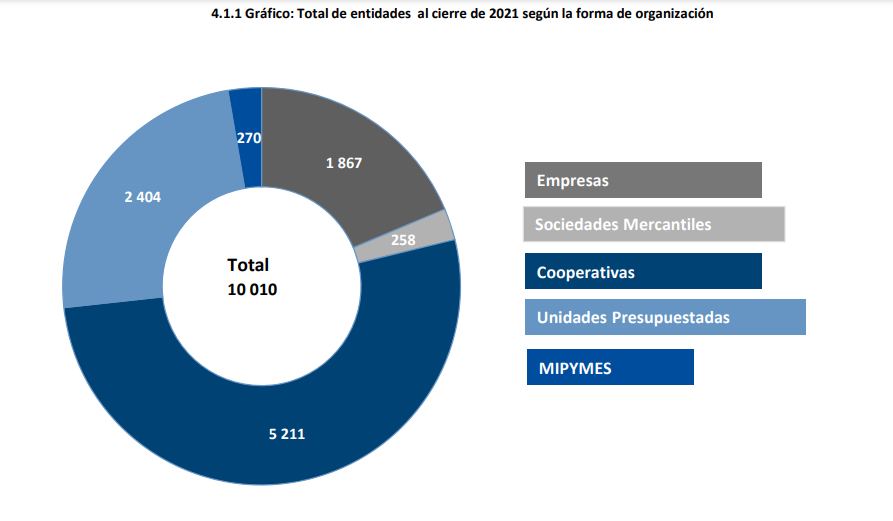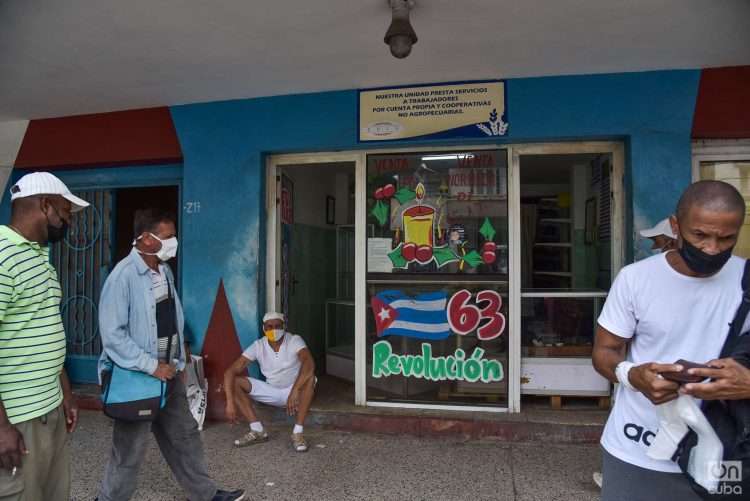In Cuba, for a long time, understanding “long” by the literal meaning of the word, small and medium-sized enterprises were frozen in time. That economic model that began to take shape at the beginning of the 1960s, consolidated the idea, at the end of those same 1960s, that development based on a socialist economic model did not have, as a necessity, to promote the existence of other forms of ownership and types of enterprises that were not, state owned and the socialist state enterprise.1 Very quickly it was understood that it was not possible, but it has taken all this time to turn that certainty into facts.
Ten years after the “revolutionary offensive” a decree-law was promulgated that opened a minimum space to the “non-state” in the figure of self-employment. The “way of the cross” of self-employment and “self-employed workers” has been more than well documented in many articles, some of them academic and others not, but most of them agree there was a need for a conception and a public policy (or various public policies), that would allow the deployment, for the benefit of the country’s citizens, of the potentialities that, looking at the shortcomings of our economy — by the way, they were not born with the pandemic — the sector could deploy.
At the end of the first decade of the 21st century and due to some ideas expressed in various speeches by the then president of the country, Army General Raúl Castro, there was some hope that in the near future there would be changes that would open up a formal and especially legal space for small businesses. But it only happened halfway, and it was necessary to wait until 2021 for the positive list of self-employed activities to be expanded. Other hopeful documents were the Guidelines (2011, 2017), the Conceptualization, the 2030 Development Plan (2021). Strategic central points, and the 2019 Constitution of the Republic. All these documents were clearing the thicket of brambles and thorns that enclosed this sector, which was already recognized as a necessity of the dynamics of the national economy.
Only in the summer of 2021 — twelve years after those ideas were expressed by Raúl — was the decree-law enacted that gave legal space to MSMEs, turned many small and medium-sized enterprises into “legal entities” and materialized what the new Constitution of the Republic endorsed, the recognition of private ownership, perhaps the most controversial of all the controversy, the most resisted of all the resistance.
ARTICLE 22. The following forms of ownership are recognized:
- a) socialist of all the people: in which the State acts on their behalf and benefit as owner.
- b) cooperative: the one based on the collective work of its owner members and on the effective exercise of the principles of cooperativism.
- c) of the political, mass and social organizations: the one exercised by these subjects on the goods destined to fulfill their purposes.
- d) private: that exercised over certain means of production by Cuban or foreign natural or legal persons; with a complementary role in the economy.
- e) joint: formed by the combination of two or more forms of ownership.
- f) of institutions and associative forms: the one exercised by these subjects on their assets for the fulfillment of non-profit purposes.
- g) personal: that which is exercised over goods that, without constituting means of production, contribute to meeting the material and spiritual needs of their owner.
All forms of ownership of the means of production interact under similar conditions; the state regulates and controls how they contribute to economic and social development.
The law regulates matters related to the exercise and scope of forms of ownership.
Constitution of the Republic of Cuba p. 3
Their number, which doubles the number of state-owned enterprises that currently “work,” is perhaps the first thing that has motivated questions like the ones that open this article. Certainly, in terms of the number of enterprises, they are about 70% of all enterprises in the country. Are they really many? I would say that in terms of the needs of the national economy, it is very difficult to know if those that exist today are all that are needed. In my opinion, many more are needed, because the empty spaces that state enterprises are unable to cover or cover poorly are over-abundant and can be seen every day, from empty cafeterias without products which continue to pay fixed costs and salaries, even important production industries that do not have a way to “start up again,” due to lack of some input or some part.

*Caption:
Enterprises
Trading Companies
Cooperatives
Budgeted Units
MSMEs
Source: ONEI
It is true that they are 70% of all the enterprises in the country, it is true that today they already generate direct employment for close to one 100,000 people, it is undeniable that many Cuban families depend on these businesses and those jobs. I don’t think their weight in the structure of the domestic product can be well calculated yet, but whatever it is, the truth is that today they are the most dynamic players in our business system.
It is also true that all those who have embarked on the path of MSMEs have bet on Cuba, on developing their skills here, in our country, on investing their resources here, in our economy — or those of the cousin who is “abroad” — , on creating here, on this land, goods and services for a population in need of seeing supply grow, on taking the risk of linking up, associating, putting together business models with state-owned enterprises, some of them in a very compromised situation. They have all been able to survive in the limbosphere and overcome the skepticism of many others and the corruption of many. They have all chosen to create wealth in Cuba, although it is true that this also means that they appropriate a good part of it, which is not only logical, but also necessary for the very existence of the “business.” Or is it preferable that they leave the country and put their entrepreneurial efforts in other economies and create wealth for those other economies? What costs more for our country?
And where does the state stand? From my perspective, the state remains for the fundamental means of production, understood as defined in the first version of the Conceptualization, “the fundamental character of a means of production lies in its strategic role in economic and social development, vitality, sustainability of the country and national security. Are all these 1,867 state-owned enterprises and all their corresponding UEBs and “establishments” strategic for the economic and social development, for the vitality, sustainability and security of the country? And the more than 500 with sustained losses, do they contribute to sustainability or unsustainability?
In 2021, the State budget closed with a high fiscal deficit, amounting to 63,696,700,000 pesos. The business sector demanded more than 16 billion from the public coffers, associated with the impact of the OT. Something necessary, but unsustainable for the sake of recovering the urgent macroeconomic balance.
Last year, 504 enterprises closed their operations with losses, of these 320 had planned profits worth 3.77 billion pesos. A part of that amount was no longer distributed to workers and affected the public treasury by approximately 1.943 billion pesos.
For the current year, the business loss subsidy is zero. However, the State budget foresees a reserve of 3 billion pesos with a view to supporting the business system. Of that total, 1 billion will be directed to the rescue of the withered Sugar Agroindustry. The rest will finance justified losses and, in no case, will support debts due to insufficient management, theft and diversion of resources.
According to this information, a quarter of the 2021 fiscal deficit had to be transferred to those who are the ones who must generate wealth for all. Those 16 billion represent 31% of the budget executed in education and 20% of the executed in public health. How many more schools and how many hospital rooms could have been repaired with that money, if used well? How much could the salary of primary school teachers have been improved? What a paradox of wealth distribution.
But the truth is that we have a new legal framework, which is based on the Constitution of the Republic and on documents approved by the Communist Party of Cuba, in other words, there is both constitutional and political support for development, growth and qualitative change of the MSMEs. Undoubtedly, there is a need to improve the coherence of public policies with this purpose, it is necessary to change and to do it now, especially in our tax system that drags a conception that responded to other realities.
In fact, the creation of joint ventures between nationals — state enterprises and MSMEs — is already a possibility about to become a reality. Something new that comes to fill a space that was previously only occupied by foreign enterprises.
Thirty years ago, just beginning what we euphemistically call the “Special Period,” Fidel explained his ideas about the relationship with foreign capital:
“We are analyzing all forms of collaboration with foreign capital in many fields. A principle must be applied: if we have factories, we have a labor force and we don’t have raw materials, we have to make that factory produce. The worst part is that the factories are not operating. If a partner appears and tells us: ‘Hey, I’ll provide you with the raw material and between the two of us we market the product and I charge for my raw material and make a profit,’ we immediately express our willingness to make the relevant agreements.”
Three decades later our reality has changed and, in the economy, not exactly for the better. A part of our productive system is in worse technological and financial conditions, foreign direct investment (FDI) flows continue to be far from what we need, tourism, which was decisive in recovery in the 1990s, today is a mature product and its post-COVID indicators are below those of the Caribbean region, the foreign debt was reborn, a migratory wave that is bleeding the country dry and compromising the future has become daily occurrence, the “post-reorganization” has resulted in a dysfunctionality that is difficult to manage and above all, a Democratic administration in the United States competes with its Republican predecessor in that never-achieved secular goal of making us their backyard.
But there are also other realities. Today there is no need to wait for the foreign partner, if he arrives, he’ll be welcome, and especially if he manages to finalize a project. Today there are a few hundred potential partners, all Cubans, perhaps with much less capital, it is true, but no less necessary because of that.
It is not enough to exhort one and the other. Public policies are needed that encourage these new alliances, that facilitate this collaboration with the same immediate character, procedures that make it almost expeditious, where we avoid the contradictions that still remain in those that regulate business with FDI.
But it is also necessary that “the persecutors of any birth” and the worshipers of the status quo understand that to advance you have to mutate.
Note:
1 It is true that in agriculture and in a small transportation sector there were survivors of the “non-state,” always with a very high degree of subordination to the state organizations that directed the activity.
***
Author’s note: I take advantage of this Column to empathize with those who have suffered the ravages of Hurricane Ian. Especially with the people of Pinar del Río, who received the worst part, and thank all the people who are helping in the recovery.










